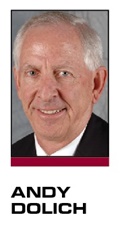In the world of pro sports, the predominant colors brought home by athletes from their daily trips to the office are black and blue.
In the front offices of sports franchises and organizations, the fluid that flows through the sports deal pipeline is green.
Every day we are inundated, informed, involved and amazed by sports business deals that shatter what we thought were unreachable standards. Records on the playing fields may stand the test of time, but monetary records relating to team value, league broadcast agreements, premium ticket costs, stadium construction and costs of all manner of sports inventory might as well be signed in disappearing ink.
The business engine of global sports is a financial sprint within a marathon driven by an ROI, wrapped in EBITDA, driven by metrics, defined by analytics, predominated by borrowed money and, with hope, leading to yearly profits and stratospheric asset appreciation.
For all the focus on competitive commerce, time is the most valuable and precious resource in the ever-growing world of sports business.
As I look at where many organizations and their executives are falling short, it is in the area of time. It’s not about time management, but the use of time as a commodity for mentoring, relationship-building, networking, management by walking around, and simple human-to-human, face-to-face conversation.
In many instances, executives, managers and team leaders are having to run a 24-hour steeplechase and are falling by the wayside. They are increasingly waylaid by the daily pressures of the job, which is complicated by league mandates, ownership pressures and media responsibilities, and a Bermuda Triangle of endless meetings and interactions with fans and sponsors while also trying to wedge in some family activity. The ongoing tidal wave of nanosecond mobile communication is putting greater pressure on the ability of managers and their staffs to spend quality team-building time together.
A few days ago, I received a call from a team executive who was questioning how he should work on allocation of precious minutes in the midst of a crucial time-eating project. I told him that even the featured high-wire star at Cirque du Soleil is going to have a difficult time balancing the demands of the job and his everyday life when the spotlight is turned off. “You might want to think about time as the most valuable gift you have both to give and receive,” I said.
From time to time, it might be valuable for team leaders to push the race for the almighty dollar to the side and realize that a hen is only an egg’s way of making another egg.
It takes time, but it’s worth it.
Andy Dolich (andy.dolich@gmail.com) is managing director of U.S. sports practice for Odgers Berndtson and has held team executive posts in the NFL, NBA, MLB and NASL.




